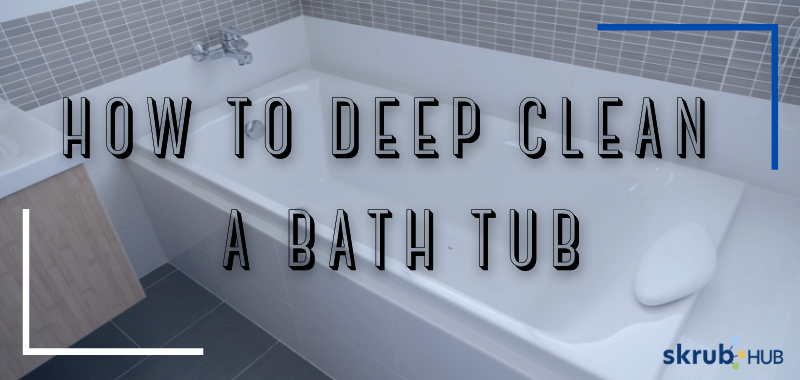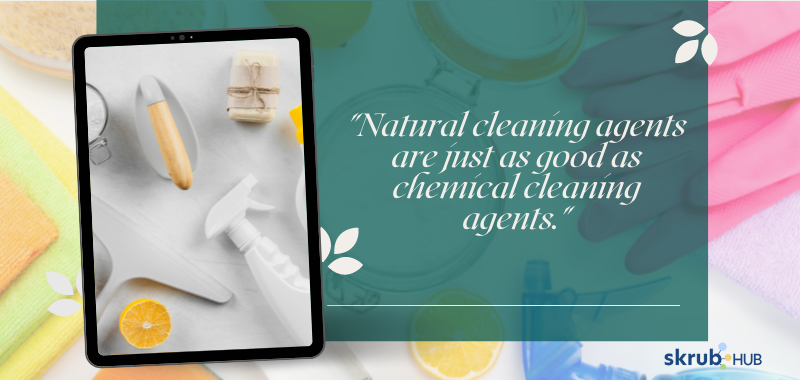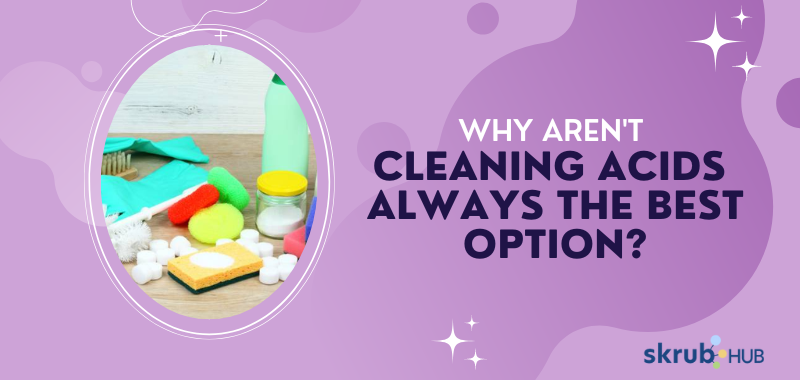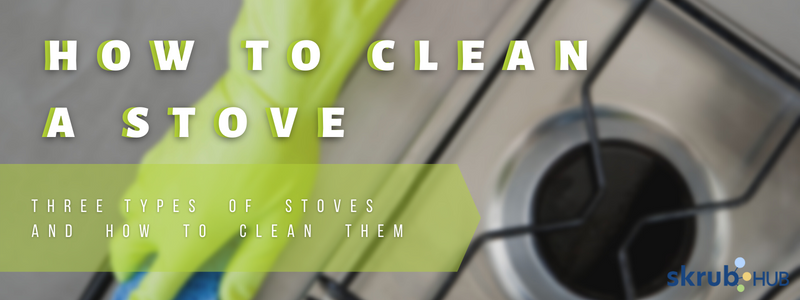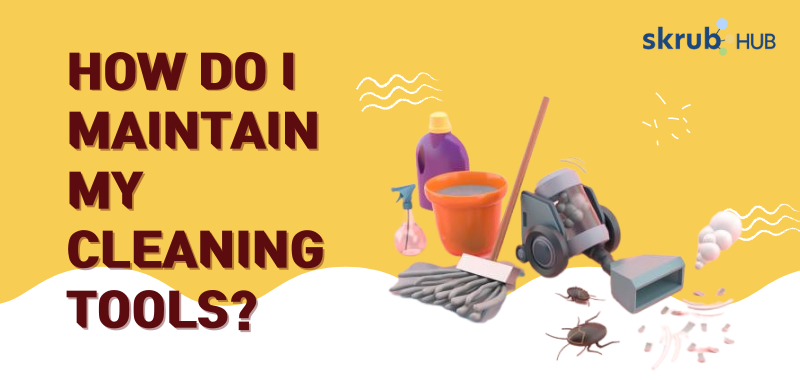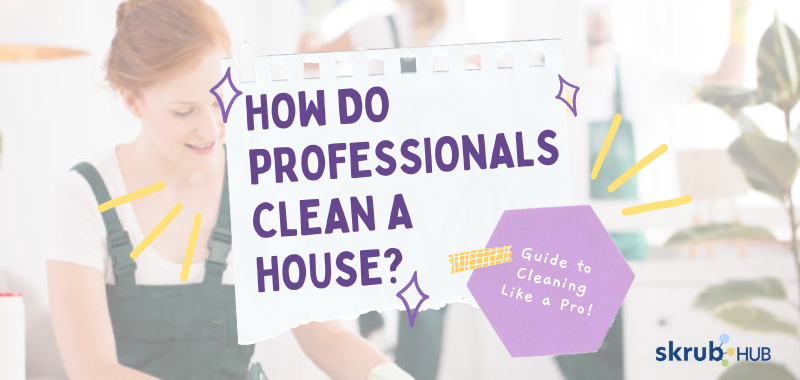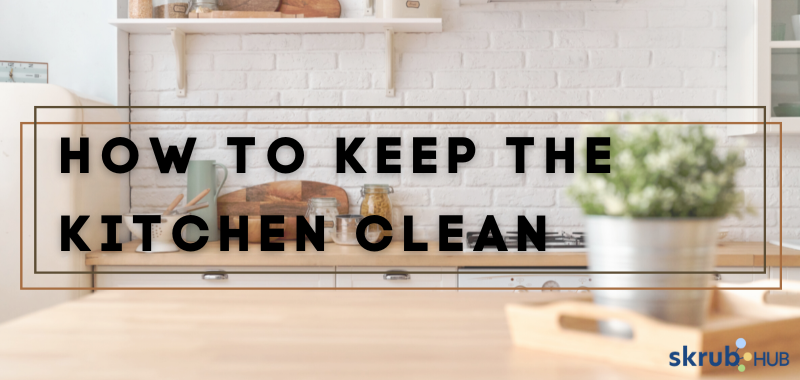
How to Keep the Kitchen Clean
How to Keep the Kitchen Clean
A clean and safe kitchen is an essential step toward a healthy home. A clean home reduces your family’s exposure to many indoor pollutants, such as bacteria and allergens, like dust mites. A clean house is also less appealing to rodents, mice, and other pests. Bacteria and germs can be found anywhere, including your kitchen, where food is stored, prepared, and consumed. Bacteria on your food, kitchen utensils, counters, appliances, floors, pets, and especially your hands can cause illness. Keeping your family safe from food poisoning and cleaning before, during, and after preparing and eating your food is critical. Surfaces and your hands are both cleaned.
Most of us have resolutions to eat healthier or cook more at home at the start of the year, which means your kitchen will most likely be the busiest room in the house, as well as the location of the messes. Whether you’re cooking for one or an entire family, keeping your kitchen as clean as possible is critical so that germs don’t take over. Keeping kitchens as clean as you should for food preparation be challenging because so many kitchens also serve as other rooms in the house. Additionally, cleaning is even more difficult if you live in a region with hard water, where there is rough limescale. However, you’ll enjoy cooking so much more and be able to find everything you need if you start when your kitchen is organised.
Why Should We Clean the Kitchen?
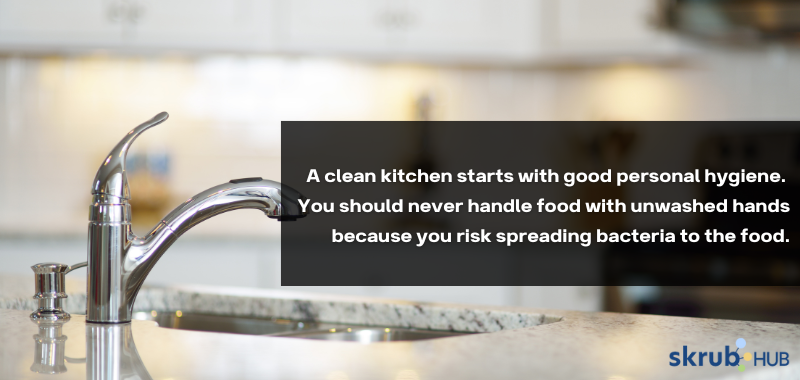
A clean kitchen starts with good personal hygiene.
A clean kitchen is essential for maintaining a healthy environment because the kitchen is where people prepare their food, and strictly personal and environmental hygiene standards must be followed. Maintaining high cleanliness levels in the kitchen, whether at home or in a restaurant, is always essential. More than any other room, the kitchen is the environment in which disease-causing bacteria and pests thrive. A clean kitchen starts with good personal hygiene. Whether you are a housewife, a domestic helper, or a restaurant employee, be aware that you are a bacteria carrier and may unknowingly transmit diseases to others. You should never handle food with unwashed hands because you risk spreading bacteria to the food.
How Often Should You Clean the Kitchen?
Cleaning your kitchen depends on how much you use it. They will not pile up if you wash them immediately after a meal. Other chores can be scheduled weekly. Examples include wiping spills from cabinet doors and appliances, wiping the dish rack, and mopping the floor. Choose a starting point (such as the stove) and clean from top to bottom, left to right, to avoid missing any spots. To avoid more extensive clean-ups in the future, wipe down ovens and refrigerators whenever you spill food. If you use your range frequently, clean it thoroughly every two to twelve weeks. If your content has a self-cleaning feature, use it to remove any remaining ash from the stove. If it is not self-cleaning, wash away any food remnants with a brush and oven cleaner. When cleaning your oven, keep your kitchen well-ventilated. Keep an eye on the expiration dates of your food in the refrigerator and throw it out as needed. At least once a month, wipe the shelves with water and mild dishwashing liquid.
How to Keep the Kitchen Clean
12 Tips: An Overview
- Make Dishwashing Less Difficult
- Counters Should be Protected during Food Preparation
- Pour, Measure, and Spray over your Sink
- Use Scrap Bowls while Cooking
- Stop Stovetop Splatters
- Using Good Cover while Microwaving
- Place Coasters beneath Condiments and Jars
- Use Liners In and On Your Refrigerator
- Maintain Drips in the Oven
- Make the Trash Can Accessible
- Make Nightly Floor Cleaning Simple
- Spend 5 Minutes A Day Cleaning
1 Make Dishwashing Less Difficult
Is there no dishwasher? If it takes too much effort to deal with dirty dishes and utensils, they will accumulate in the sink. Instead, after dinner, run your dishwasher and empty it before bed so you can start the day with a clean sink. Then, while relaxing after dinner, let hand-washed dishes dry on a rack.
2 Counters Should be Protected during Food Preparation
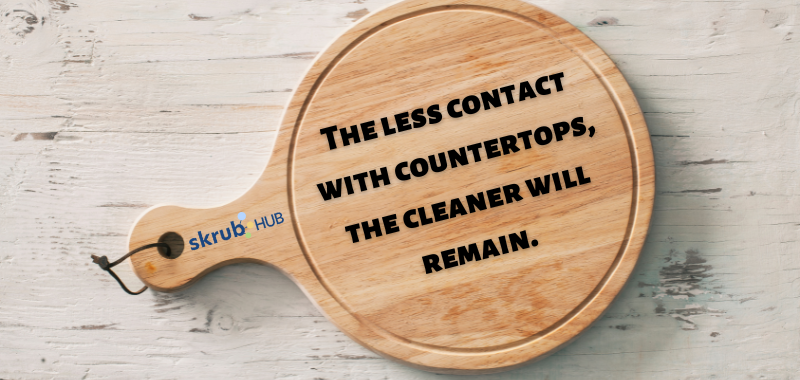
The less contact with countertops, the cleaner will remain .
Use a cutting board when chopping vegetables. Prepare raw meats on a rimmed baking sheet that could be placed in the dishwasher. Roll out the pastry or dough on parchment paper or a silicone baking mat. The less contact with countertops, the cleaner will .
3 Pour, Measure, and Spray over your Sink
No matter how careful you are, some kitchen tasks leave a mess. Examples include using cooking spray, measuring ingredients, or ladling soup into serving bowls. If you don’t like scrubbing your counters after every meal, do it over your kitchen sink. Then, all that remains is to rinse the mess away.
4 Use Scrap Bowls while Cooking
After you’ve finished your meal, add the leftovers to your compost pile if you have one. Alternatively, place them in the freezer to be used later.
5 Stop Stovetop Splatters
Have you ever avoided certain recipes because they would splatter grease all over your kitchen? You are not required to remove those meals from the menu. Instead, a wire splatter guard would be of good use whenever you can’t cover the pan while cooking. Always put it back after each use or give it a quick wash.
6 Using Good Cover while Microwaving
Covering microwave foods with a paper towel is wasteful, and they don’t always stay in place. For a secure cover, use a plate or an overturned bowl.
7 Place Coasters beneath Condiments and Jars
Using washable coasters beneath condiments prevents them from smearing your shelves. They’re great for use with sticky pantry items like honey or syrup. To clean the pantry, simply wash the coasters and wipe — not scrub — the shelves.
8 Use Liners In and On Your Refrigerator
Lining refrigerator shelves and drawers make cleaning easier. On shelves, use cling wrap or clear liners. Using newspaper or paper towels in drawers also helps to keep fresher. But don’t stop with the shelves! Line the top of your refrigerator with a tea towel to collect dust and wash it every few weeks.
9 Maintain Drips in the Oven
Mainly using foil at the bottom of the oven is a fire hazard and will almost certainly void the warranty on your appliance. That doesn’t mean you have to accept baked-on messes. Place a baking sheet on a rack beneath drippy items such as casseroles, frozen pizzas, or lasagnas. After cooking, remove the sheet, cool it, and place it in the dishwasher.
10 Make the Trash Can Accessible
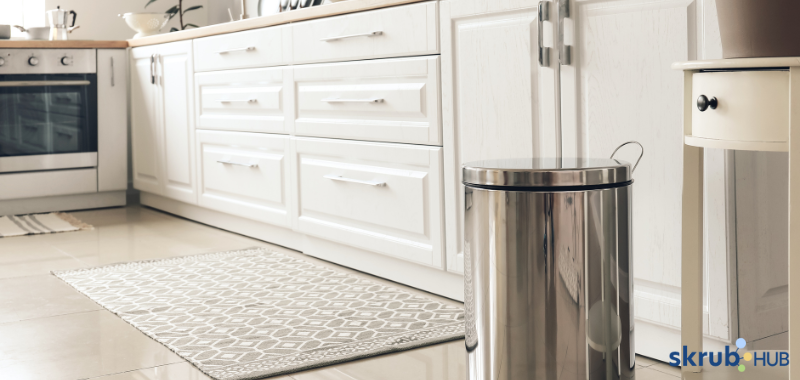
The worst place for your trash can is under the kitchen sink. If it’s not easily accessible, you leave things on the counter, making it easy to forget. If you use a self-contained, foot-operated trash can, you won’t have to empty it frequently. Are you concerned about the odours emanating from garbage cans? To catch drips, tuck newspaper sprinkled with baking soda in the bottom. Then, when you take out the trash, change it.
11 Make Nightly Floor Cleaning Simple
Use a cordless vacuum or powered sweeper in the kitchen. Run the vacuum under your table and at the cabinets every night to keep your kitchen looking clean.
12 Spend 5 Minutes A Day Cleaning
Tuck a rag and non-toxic cleaning spray under your sink to make cleaning easier. To finish, rinse the cloth and add soap before wiping down your sink. Next, spray and wipe all the fronts of your appliances and any clear space on your counters and tabletop once a day.
Final Takeaway
One of the most critical rooms in the house is the kitchen. Some designers refer to it as the home’s heart. People not only eat there but also exchange ideas and stories. Preventing messes in the first place is the simplest way to keep your kitchen clean. Always spend a few moments each day tidying up, and your kitchen will always look neat.
Related Post
How to Keep the Kitchen Clean A clean and safe kitchen is an essential step toward a healthy home. A...
How to Deep Clean a Bath Tub The bathtub is one of the few household chores that few people can...
How to Clean the Pool When was the last time you had your pool cleaned? We mean thoroughly cleaned it....
How to Clean the Attic The attic is probably one of those places in your home that you don’t think...
Natural cleaning agents are just as good as chemical cleaning agents When you shop for products you will use, those...
Why aren’t cleaning acids always the best option The pieces of furniture we have and the fixture inside our houses...
How to clean the driveway? Your home’s first impression always matters, as portrayed by the front of your house. Therefore, cleaning...
How to clean the driveway? Your home’s first impression always matters, as portrayed by the front of your house. Therefore, cleaning...
How to clean a stove? – Three types of stoves and how to clean them Cooking is an essential part of...
How do I maintain my cleaning tools? – Tips for long-lasting cleaning essentials! As a cleaner, your cleaning tools can be...
How can I clean the wall marks without damaging the paint? Every part of the house is essential to clean. It...
Air freshener: a Band-Aid solution for Odor Having a squeaky clean finish is essential in cleaning an area. However, generating a...
How Do Professionals Clean A House? – Guide to Cleaning Like a Pro! Commonly, a home is one’s safe spot to...
Free House Cleaning Schedule – Tips For An Established Home Cleaning Schedule Cleaning is part of the daily routine that one...
How To Keep Your House Clean When You Work Full Time – 6 Cleaning Tips For the Busiest People Having a...
How To Find A Dependable Cleaner Most individuals today find it hard to take some time to clean their homes. Business...
9 Signs That You Hired A Good Cleaner In this current pandemic, it’s more vital than ever to maintain your home...


